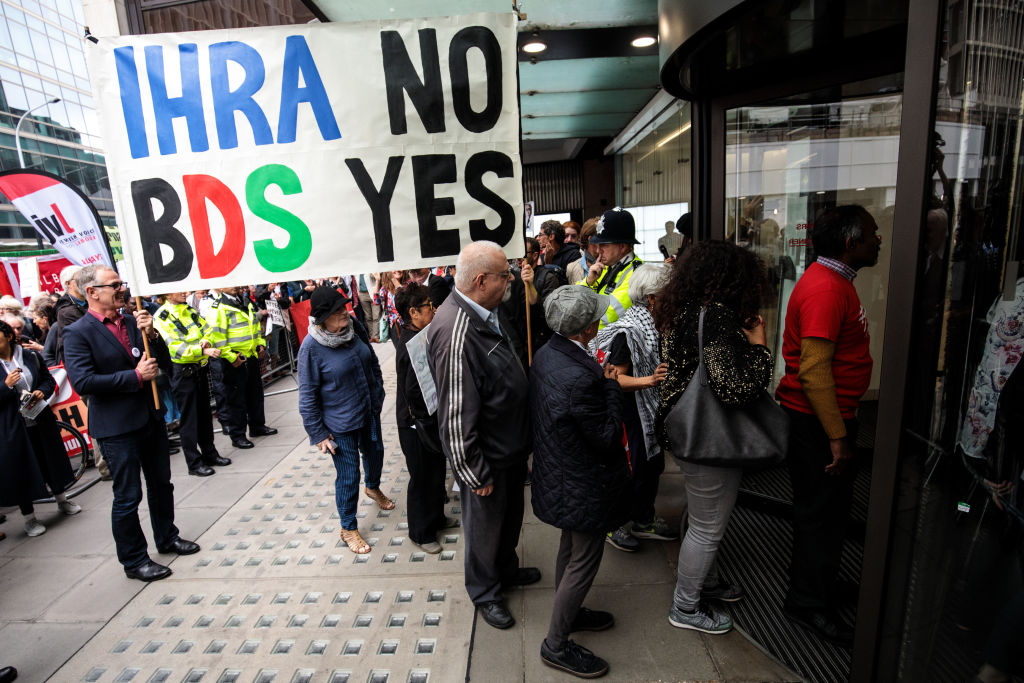
On September 4, 2018, in London, protesters demonstrate against the adoption of the IHRA definition of anti-Semitism. Photo by Jack Taylor/Getty Images.
This Week’s Guest: Kenneth Marcus
With anti-Semitism on the rise over the last few years, it is essential for institutions to be able to assess clearly whether an incident is anti-Semitic or not. For this purpose, over the last two decades many governments, companies, and international organizations have, as Joshua Muravchik discusses in this month’s Mosaic essay, adopted the “working definition of anti-Semitism” from the International Holocaust Remembrance Alliance (IHRA). Today, the U.S. federal government uses the IHRA definition to assess federal claims of anti-Semitism under Title VI of the 1964 Civil Rights Act, and all government agencies also consider the IHRA definition in their own assessments of anti-Semitism.
This week, Kenneth Marcus, who was instrumental in getting the federal government to adopt the IHRA definition of anti-Semitism, joins our podcast. Formerly the assistant secretary for civil rights in the Department of Education, Marcus has played a major role in protecting the civil rights of diverse groups, including Jews facing anti-Semitism; he’s also the author of Jewish Identity and Civil Rights in America, and The Definition of Anti-Semitism. In conversation with Mosaic’s editor Jonathan Silver, he explains how the IHRA definition helps American officials protect civil rights.
Musical selections in this podcast are drawn from the Quintet for Clarinet and Strings, op. 31a, composed by Paul Ben-Haim and performed by the ARC Ensemble.
Excerpt (15:27-17:36):
Protecting the rights of Jewish students has always been more difficult than other groups, and of course I’ve worked to protect the rights of virtually every racial and ethnic minority, as well as women, the disabled, the aged, and other groups, and yet there’s always more controversy attached to any issue involving anti-Semitism. In fact, even the very basic notion that we should protect Jewish students from anti-Semitism at all had enormous pushback, and it should be surprising I think to your listeners that it was only in 2004 that we provided basic protections to Jewish students, and that even then this policy was largely disregarded for a significant part of the period between 2004 and 2010.
This is very recent, and yet I had pushback along a number of different lines. There were conservatives who thought that I was interpreting the statue too broadly and that we should have a narrower interpretation of the statute. I considered that to be wrong. I think that there’s simply no reasonable interpretation of the statute under which Jews lack protections, it’s simply a straightforward interpretation. There were liberals who thought that the resources of the civil-rights apparatus should be focused on under-represented or non-privileged groups, and that American Jews by and large had sufficient privilege and resources and should not be the beneficiaries of civil-rights investigations. There were bureaucrats who tended to be change-averse, and who are reluctant to change the way things were going. There were some on the left who were suspicious of any effort within a Republican administration to do anything that would protect a religious group, since that looked like some sort of, perhaps, dubious use of the law to protect a religion.
Everybody it seems, left, right, and center, had some reason to be suspicious of efforts to protect Jewish students, whether they had anything to do with anti-Zionism or not, so even the most basic efforts to protect Jewish students have faced far greater pushback than what I’ve seen with every other group.
